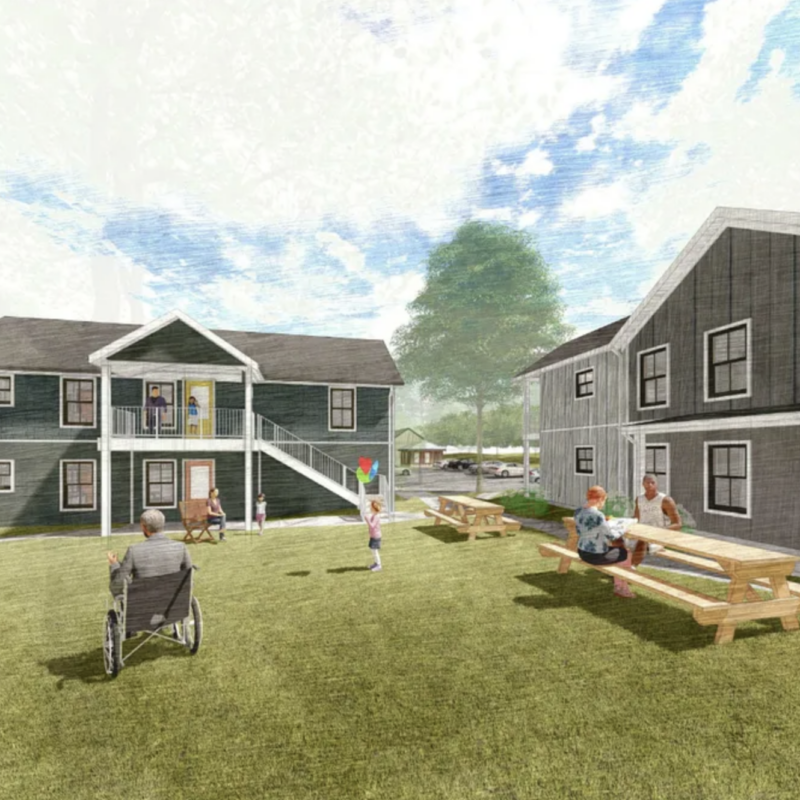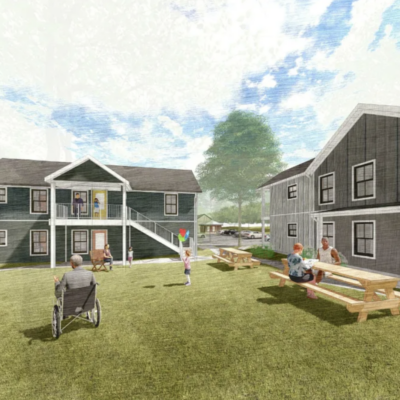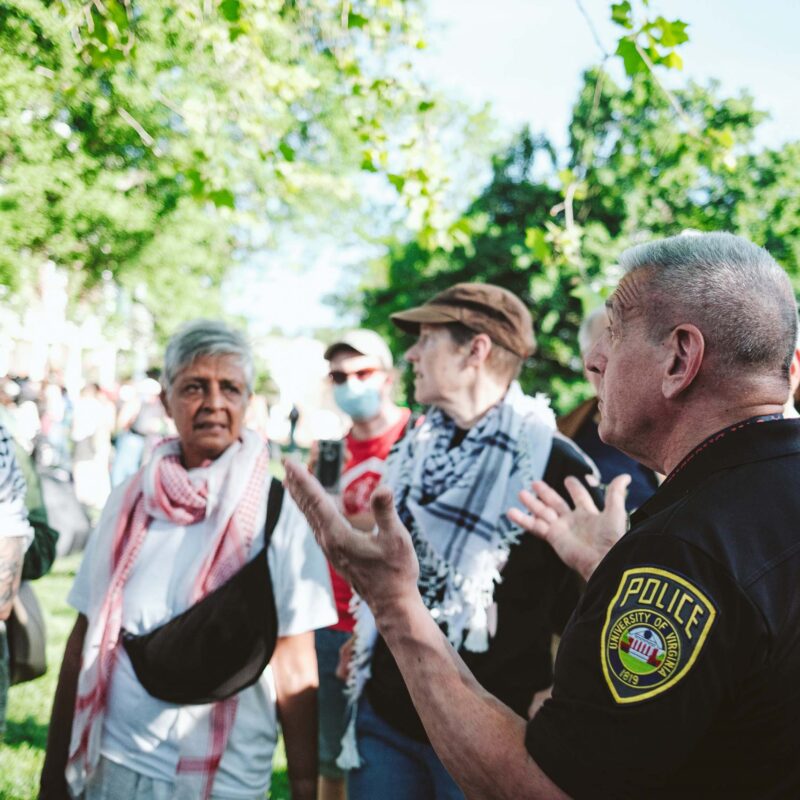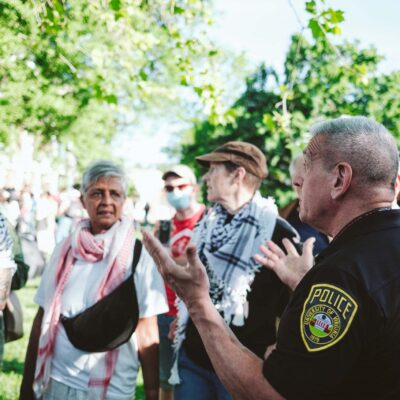Hear that giant sucking sound of greenbacks whooshing down voracious twin vortexes of grocery store and gas station? Consider getting rid of currency altogether and trading directly with your fellow citizens. What I found, taking a dip in the local barter scene, is a bit more complicated. Bartering can be a one-time event or a lifetime commitment.
 Cartoonist, gallery owner, and town council member Bebe Williams, who once farm-sat in return for a leg of lamb, grooves to Scottsville’s bartering opportunities. |
And sometimes it comes down to a simple need to clean out the freezer.
I started by clicking on ‘barter’ at the local craigslist website. Bingo: an offer of “Fresh Frozen Trout to trade…(not freezer burnt).” Of course I jumped right on it, but unfortunately the trout did not survive the trader’s family fish fry over the Fourth. I ended up negotiating instead for a free range chicken, also frozen, for which I traded a couple of buckets of fresh flowers and herbs with a genial fellow named Dale Haskins.
Imagine the trucking system broken down (and how far a stretch is that?)—wouldn’t it be nice to know someone with food to trade?
Dale and his wife, Cyndi, live in a little bungalow in old Belmont and are happy to barter whenever they can. Cyndi leads the family in finding ways to “think outside the ever shrinking monetary box,” as Dale quotes her in an e-mail. When they first bought their house, they traded an old Ford Ranger with a mason who cut brick and installed windows (as well as throwing in a bit of extra cash for the truck).
Most people have completed some kind of exchange through word of mouth among neighbors, friends or customers. One organized example: Piedmont Garden Swap is a local Yahoo! group that has a neighborly feel, with lots of seed and plant exchanges along with garden advice.
As a garden designer and consultant, I’ve had the occasional client offer to trade a massage or music lesson. So far, I’ve gone for the check, but as I discover how pervasive the practice of bartering is, I’m becoming more intrigued.
Not just a pretty deal
There’s something very basic, very here and now, in a good barter. Dale said he was glad to get the flowers for his wife and I felt good getting a nice hefty chicken from their Horse & Buggy share (albeit one-legged—a fox perhaps out on the free range?) without having to part with any cash.
 Bartering worked like a charm for Charlottesvillian Kristin Adolfson. A friend of a friend, Barrett Eastwood, who owns Wood Design Build, helped her design and build a deck in exchange for creating his wedding invitations. She owns Still Point Press, which does graphic design, web design, letterpress, among other things. They each paid for their own materials, and then did the labor for free, as it were. Adolfson admits she helped Eastwood a bit, but only because she was eager to learn from him, so she could do it herself next time—maybe even build a deck for someone else in exchange for…skydiving lessons? |
Melanie Lepper, local massage therapist and Feldenkrais practitioner, who’s bartered for 10 years or so, says one of her best experiences was working with a client who had cerebral palsy and happened to be an electrician. “He needed my services and valued them to keep him agile enough to do his work. I needed new lights. It was a win-win,” she says in an e-mail.
Then there are the people who see bartering as a way to change the world—yes, they are still out there; they want you to join them and imagine an alternative economic system. “As a permaculturist, community-based solutions are very important to me,” says Michelle Maggiori, founding member of Scottsville Barter Network.
“Once we remember that people themselves invented the ideas of ‘work’ and ‘money’, [we realize] people have every opportunity to rework those definitions,” she e-mails. “Money and time are really fascinating—no one feels they have enough of it—and yet it is something people invented….Tomorrow who knows what money will be worth.”
For professional gardener Georganne Arave, born and raised in Charlottesville, “it’s a socialist thing—it’s the heart of me. I’m not a capitalist, never have been. If I could I’d barter everything. …I have had the socialist ideal since I was a student in high school.” She’s been involved in numerous barters connected with building houses she’s lived in, including the current one just nearing construction. Her former husband, a contractor, often bartered for rock work or plumbing. “For [him], well, he was always open to keeping his cash, so it suited him.”
Georganne has seen a few barters go awry because of faulty communication and misunderstandings. “I will say that each person needs to be clear on the value of their barter. The trades professions offer some great opportunities if the deal is a clear, honest and respectful barter.”
Some see a way to meet new people and connect with neighbors. Veterinarians Karen Digiorgis and her husband, Giovani, “met a lot of people we wouldn’t know otherwise” through the Scottsville Barter Network.
It can be convenient, too. They needed a special piece of trim one busy weekend to finish a project and had no time to do it themselves before a big family event. They “put it out over the network and got it done.”
“You might think, ‘I don’t have anything to offer,’” says Karen, “but you get creative. It doesn’t have to be your profession. It can be bean soup or child care.”
Getting organized
People like Dale and Cyndi, Melanie and Georganne prefer individual trades, but Michelle and the Digiorgises belong to the Scottsville Barter Network (SBN), which goes beyond direct trading and issues its own currency (perfectly legal as long as it in no way resembles bills issued by the Feds). At first, this seems counter-intuitive—isn’t the whole idea to eliminate the paper money thing?
Not necessarily. Using scrip means you’re not limited to trading only with people who have what you want and are willing to take your particular skills or goods in return. For a lesson in humility, start evaluating what you would have to offer in an apocalyptic total trade economy. I’d certainly feel better with some scrip.
In the ideal network, the carpenter who needs her sofa re-covered does not have to find an upholsterer who needs cabinets, but pays in scrip, as long as someone with upholstering skills is a member. Of course, this is not always the case. One of the reasons for the success of Scottsville’s barter network, in addition to its dedicated core of volunteers, may be the fact that its membership boasts several carpenters.
Melanie, the massage therapist, belonged to a network in Seattle but now prefers to barter individually: “People always love to get bodywork for free and I was quite busy but not able to use all the hours I accumulated in the barter bank. I just didn’t need any of their services.”
A further issue is how to value members’ time. The group Melanie belonged to out West “did not work on a dollar to dollar value system. It was an hour equals an hour.” Skilled in therapeutic massage, for her “an hour of my time was not in my opinion equal to an hour of someone pulling weeds for me or giving me a ride to the airport.”
When SBN organized back in 2005, one of the first issues was how to value the scrip. Michelle found early on that “some people don’t like the idea that my time is worth what your time is worth.” SBN guidelines encourage members to value their time equally but also advise a ceiling of one and a half Scottscrips per hour. Michelle says she has paid more than initially agreed if she feels someone has done an especially good job.
They ended up pegging a half hour at $5, based on the living wage in Charlottesville, with everyone’s hour rated equally. Though there was some contention, “if they didn’t agree on the dollar value, they agreed everyone has the same amount of time, an hour for an hour,” Michelle says.
What goes around comes around, and one of the appeals of a barter currency is to keep money local. This karmic currency continues to circulate, contributing to local relationships and businesses. Also, as Michelle writes, “people that might feel strange asking for help feel a little less apprehensive because they have these colorful scrips to offer in return.”
The Scottsville Barter Network is the most vigorous local barter organization. Late in 2006, Michelle assisted in an attempt to revive the old Charlottesville Barter Network, begun around 2000, renaming it the Rivanna Barter Network (now hosted on tradelocal.org). Although scrip was issued originally, it is no longer in circulation.
Jen Downey, one of the original members of CBN, says in an e-mail, “Ours foundered mostly because we could never make it worth someone’s while to be…ultimately responsible for…upkeep. None of us really stepped up to the plate for passion’s sake either.” Terry Lilley, member of the current Rivanna Barter Network, echoes Jen on the difficulties of maintaining an organization that depends fundamentally on volunteers: Plenty of barter goes on in Charlottesville, she says, but not within a network. So far, the management of RBN has “fallen through the cracks.”
Perhaps because it draws from a much smaller community, SBN has been actively growing since the first day of spring in March 2005, when Michelle Maggiori and five others met at the Scottsville Library to watch a video about Ithaca Hours, a successful alternative scrip economy in New York. They sent away $20 for a starter kit from ithacahours.com and never looked back. Everyone volunteers their work and individual members are responsible for processing applications, keeping the directory current, and maintaining the website.
I joined online, then snail-mailed the downloaded application along with one U.S. dollar. For this I received 20 half-hour Scottscrips, worth $100 within the network—quite a deal, especially since the group is currently voting online to up the membership fee a dollar or two to cover increased postage rates. There’s also been a recent uptick in applications. With three printings of Scottscrip since 2005, there are over 800 of the half-hour notes in circulation.
My scrip makes a nice thick wad and is burning a hole in my pocket.
I send an introductory message to the group describing the goods and services I have to trade (or sell to earn more scrip): cut flowers, flower arranging, design and horticultural consultations, editing/proofreading, document production; and a few things I’m looking for: an office chair, a porch glider and a full-sized bed frame. I could surely find these things at yard sales, but I hate shopping in any form, particularly yard sales, and posting through a network seems much more efficient.
River traders
As promised, it was a friendly—even idyllic—evening when I attended an SBN meeting as a new member July 1. Folks streamed in from the parking lot carrying dishes of pesto pasta, lentils, homemade bread and fresh mixed greens, which I eyed respectfully as I sidled my canned salsa, bean and frozen corn dip in with a sleeve of saltines amongst the elegant fare.
Ten to 15 people showed up over the course of a couple of hours, with a few children in tow who periodically frolicked on the clovery grass or watched a soccer game across the field. Occasionally a train whistled through going east on the other side of the levy. Fireflies were beginning to float up out of the grass by the time we broke up.
Michelle, a lively young woman dressed in flowing cottons and honey-colored dreadlocks, is at the center of everything, arriving with utensils and paper plates. She is the mother of three daughters and wife of Michael Courts of Lithic Construction. They moved to Scottsville from Virginia Beach in 2001 and set up a household on one-and-a-half acres they’ve named “Horseshoe Hill” where they raise their children and Michelle grows vegetables and cut flowers. Their greenhouse was partially built with scrip-paid labor.
She’s just begun managing the Saturday farmers’ market (some farmers accept Scottscrip) and her banter back and forth with the members shows how deeply she’s immersed in the world of local farmers and small businesspeople. They talk about an upcoming tomato tasting and discuss new regulations for home kitchens.
In addition to the Digiorgises, Cynthia Bruce, owner of the local bed and breakfast, High Meadows, and one of the newer members at six months, attended along with the town council’s newest member, cartoonist and gallery owner, Bebe Williams. Cynthia got an old island removed from her kitchen through the network and Bebe accepts Scottscrip at his gallery on Scottsville’s main drag.
Bebe, two years a local via New York City, Richmond and Colonial Heights, regales the group with his attempts to negotiate a trade for a turducken. He has farm-sat in return for a leg of lamb—obviously a carnivore among vegetable lovers, though there is a bit of chicken in the delicious arugula salad.
“Scottsville is just like NYC,” he says, “only one block long.” And there is an international flavor to the SBN, with members hailing variously from Italy, Spain, France and El Salvador as well as Virginia.
Everyone’s intrigued about the newest member, a massage therapist who has joined online but not yet made any trades. Massage, particularly therapeutic massage, recurs as one of the most popular of bartering services.
Next week I visit Bebe’s studio. He’s kicked back in a straight-back chair behind the rail of a deep wrap-around porch, perusing the Scottsville city code in preparation for his first town council meeting, kept company by a number of potted vegetables and a large contented cat snoozing companionably in an adjacent chair.
The big old house is ramshackle, with a Dickensian tumble of original paintings, prints and comic books (he wrote a daily strip for 15 years), cigar boxes, old photographs and all things Bebe. When I ask how he came to run for town council, he replies, “Their offices are just across the street. I felt the aura.”
I spend $45 in Scottscrip: $30 for a framed numbered print of one of his originals—a striking Technicolor beach scene—and $15 for two old cigar boxes from a mountain he’s accumulating in one of the corners. It’s like playing with Monopoly money, yet my purchases are substantial and I’m glad to have them.
As I drive up out of the little river town with my purchases stowed in the back seat (after having some sweet tea with Bebe across the street at Pee Wee’s Pit Barbecue where “they give me things for free”), it occurs to me that people have been bartering along these banks for quite some time (I think of the old bateaus). All these relative newcomers are part of a very old flow. Maybe it’s something in the water.
When Michelle and her family moved to Horseshoe Hill they found five-strand barbed wire strung throughout the woods. “It was horrible,” she recalls. She had a psychological block and just couldn’t face the job. With an anniversary party looming, two network members with gloves and a can-do attitude knocked it out in a few hours for the requisite amount of scrip.
“If I’d only got the barbed wire out, it would have been worth it,” she says often over the course of several interviews. But of course she got much more than that, and so did Scottsville.
Come the apocalypse, they’ll be ready.





